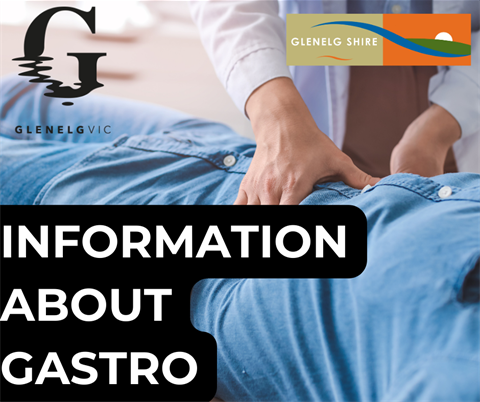Gastroenteritis information

From time to time there are increased reports of Gastroenteritis (also known as gastro) in Glenelg Shire, including in childcare facilities and schools.
An incidence of gastro in a family can be a trying and testing time, as well as for families who may not be affected but use a facility where there has been an outbreak.
In an effort to answer some of those concerns, Glenelg Shire Council has put together the following questions and answers.
What is viral gastroenteritis (gastro)?
Gastroenteritis can be caused by a number of different things, however the most common is viruses such as norovirus, rotavirus, astrovirus and adenovirus. Gastro is highly infectious, and the spread of infection to other people in the household or other close contacts is very common.
What are the symptoms to look out for?
In general, gastroenteritis symptoms can include:
- Nausea
- Vomiting
- Abdominal cramps/pain
- Diarrhoea
- Loss of appetite
- Generally feeling unwell
These symptoms can take up to three days to develop and usually last one to two days, sometimes longer. If symptoms are severe or they persist, or you are concerned, see a GP for advice and possible testing through a faecal specimen.
Most people recover without complications but gastroenteritis may be more serious for infants, people with suppressed immunes systems, and the elderly.
How does gastro spread?
Gastro spreads when a person comes into contact with the vomit or faeces (poo) of an infected person, including:
- Direct personal contact of an infected person (unwashed hands are placed directly in mouths)
- Indirectly by touching contaminated surfaces such as taps, toilet flush handles, children’s toys and nappies
- Consuming or drinking contaminated food or drinking contaminated fluids
What advice is there for the community?
One of the best defences against the spread of viral gastro is to wash your hands thoroughly with soap and running water for at least 20 seconds:
- Before eating
- After going to the toilet
- After changing nappies
- Cleaning up when someone has been sick
Alcohol hand rub, while effective against some viruses, is not sufficiently effective for preventing viral gastroenteritis.
I think I’ve got gastro – can I still work, can I still send my child to care?
If you have gastroenteritis:
- Rest at home and do not go to work
- Children with gastroenteritis should not attend childcare, kindergarten, school, camps or any other recreational group activities until 48 hours have passed since their last symptom
- Do not prepare food for others or care for children, elderly people or patients until 48 hours have passed since your last symptom. This includes people whose work involves caring for children, the elderly or other vulnerable individuals.
- Drink plenty of clear fluids
If you are caring for someone with gastroenteritis:
- Wash your hands thoroughly with soap and running water for 20 seconds after any contact with the sick person
- Any contaminated surfaces should be immediately and thoroughly cleaned with hot, soapy water and disinfected with a household disinfectant, this includes removing and washing clothing or linen that may be contaminated with stool or vomit.
- Wear gloves and mask when cleaning up bodily fluids, including vomit
Where can I get more information?
The Victorian Government’s Better Health Channel is a great source for further advice and can be accessed at https://www.betterhealth.vic.gov.au/health/conditionsandtreatments/gastroenteritis.
__PRESENT
__PRESENT
__PRESENT
__PRESENT
__PRESENT
__PRESENT
__PRESENT
__PRESENT
__PRESENT
__PRESENT__PRESENT
__PRESENT__PRESENT
__PRESENT